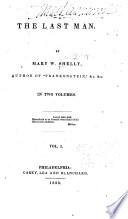Works
Frankenstein, or the Modern Prometheus
Mary Wollstonecraft Shelley
The Last Man
Mary Wollstonecraft Shelley
Mathilda
Mary Wollstonecraft ShelleyFamous Mary Wollstonecraft Shelley Quotes
“No man chooses evil because it is evil; he only mistakes it for happiness, the good he seeks.”
Variant: No man chooses evil because it is evil; he only mistakes it for happiness, the good he seeks.
Mary Wollstonecraft Shelley Quotes about love
The monster to Robert Walton
Frankenstein (1818)
Context: You, who call Frankenstein your friend, seem to have a knowledge of my crimes and his misfortunes. But in the detail which he gave you of them he could not sum up the hours and months of misery which I endured wasting in impotent passions. For while I destroyed his hopes, I did not satisfy my own desires. They were forever ardent and craving; still I desired love and fellowship, and I was still spurned. Was there no injustice in this? Am I to be thought the only criminal, when all humankind sinned against me?
Matilda (1819)
Context: My greatest pleasure was the enjoyment of a serene sky amidst these verdant woods: yet I loved all the changes of Nature; and rain, and storm, and the beautiful clouds of heaven brought their delights with them. When rocked by the waves of the lake my spirits rose in triumph as a horseman feels with pride the motions of his high fed steed.
But my pleasures arose from the contemplation of nature alone, I had no companion: my warm affections finding no return from any other human heart were forced to run waste on inanimate objects.
The monster to Robert Walton in Ch. 24
Frankenstein (1818)
Mary Wollstonecraft Shelley Quotes about feelings
Source: Victor Frankenstein in Ch. 5
Victor Frankenstein in Ch. 4
Frankenstein (1818)
Context: No one can conceive the variety of feelings which bore me onwards, like a hurricane, in the first enthusiasm of success. Life and death appeared to me ideal bounds, which I should first break through, and pour a torrent of light into our dark world. A new species would bless me as its creator and source; many happy and excellent natures would owe their being to me. No father could claim the gratitude of his child so completely as I should deserve theirs.
Source: Frankenstein
Source: Frankenstein
Mary Wollstonecraft Shelley: Trending quotes
The monster to Robert Walton
Frankenstein (1818)
Context: Some years ago, when the images which this world affords first opened upon me, when I felt the cheering warmth of summer and heard the rustling of the leaves and the warbling of the birds, and these were all to me, I should have wept to die; now it is my only consolation. Polluted by crimes and torn by the bitterest remorse, where can I find rest but in death?
Introduction http://www.rc.umd.edu/editions/frankenstein/1831v1/intro.html to the 1831 edition of Frankenstein
Mary Wollstonecraft Shelley Quotes
The monster in Ch. 13
Frankenstein (1818)
Context: What was I? Of my creation and creator I was absolutely ignorant, but I knew that I possessed no money, no friends, no kind of property. I was, besides, endued with a figure hideously deformed and loathsome; I was not even of the same nature as man. I was more agile than they and could subsist upon coarser diet; I bore the extremes of heat and cold with less injury to my frame; my stature far exceeded theirs. When I looked around I saw and heard of none like me. Was I, then, a monster, a blot upon the earth, from which all men fled and whom all men disowned?
I cannot describe to you the agony that these reflections inflicted upon me; I tried to dispel them, but sorrow only increased with knowledge. Oh, that I had forever remained in my native wood, nor known nor felt beyond the sensations of hunger, thirst, and heat!
“Live, and be happy, and make others so.”
Justine Moritz in Ch. 8
Frankenstein (1818)
Robert Walton in "Letter 1"
Source: Frankenstein (1818)
Context: I feel my heart glow with an enthusiasm which elevates me to heaven, for nothing contributes so much to tranquilize the mind as a steady purpose — a point on which the soul may fix its intellectual eye.
Source: Frankenstein
The monster to Robert Walton
Frankenstein (1818)
Context: I seek not a fellow feeling in my misery. No sympathy may I ever find. When I first sought it, it was the love of virtue, the feelings of happiness and affection with which my whole being overflowed, that I wished to be participated. But now that virtue has become to me a shadow, and that happiness and affection are turned into bitter and loathing despair, in what should I seek for sympathy? I am content to suffer alone while my sufferings shall endure; when I die, I am well satisfied that abhorrence and opprobrium should load my memory. Once my fancy was soothed with dreams of virtue, of fame, and of enjoyment. Once I falsely hoped to meet with beings who, pardoning my outward form, would love me for the excellent qualities which I was capable of unfolding. I was nourished with high thoughts of honour and devotion. But now crime has degraded me beneath the meanest animal. No guilt, no mischief, no malignity, no misery, can be found comparable to mine. When I run over the frightful catalogue of my sins, I cannot believe that I am the same creature whose thoughts were once filled with sublime and transcendent visions of the beauty and the majesty of goodness. But it is even so; the fallen angel becomes a malignant devil. Yet even that enemy of God and man had friends and associates in his desolation; I am alone.
The monster to the blind man in Ch. 15
Frankenstein (1818)
Context: I am an unfortunate and deserted creature, I look around and I have no relation or friend upon earth. These amiable people to whom I go have never seen me and know little of me. I am full of fears, for if I fail there, I am an outcast in the world forever.
“You, who call Frankenstein your friend, seem to have a knowledge of my crimes and his misfortunes.”
The monster to Robert Walton
Frankenstein (1818)
Context: You, who call Frankenstein your friend, seem to have a knowledge of my crimes and his misfortunes. But in the detail which he gave you of them he could not sum up the hours and months of misery which I endured wasting in impotent passions. For while I destroyed his hopes, I did not satisfy my own desires. They were forever ardent and craving; still I desired love and fellowship, and I was still spurned. Was there no injustice in this? Am I to be thought the only criminal, when all humankind sinned against me?
Source: Frankenstein
Robert Walton in "Letter 2"
Source: Frankenstein (1818)
Introduction http://www.rc.umd.edu/editions/frankenstein/1831v1/intro.html to the 1831 edition of Frankenstein
Source: Frankenstein
The monster to Robert Walton
Source: Frankenstein (1818)
Context: I was nourished with high thoughts of honour and devotion. But now crime has degraded me beneath the meanest animal. No guilt, no mischief, no malignity, no misery, can be found comparable to mine. When I run over the frightful catalogue of my sins, I cannot believe that I am the same creature whose thoughts were once filled with sublime and transcendent visions of the beauty and the majesty of goodness. But it is even so; the fallen angel becomes a malignant devil. Yet even that enemy of God and man had friends and associates in his desolation; I am alone.
Context: I seek not a fellow feeling in my misery. No sympathy may I ever find. When I first sought it, it was the love of virtue, the feelings of happiness and affection with which my whole being overflowed, that I wished to be participated. But now that virtue has become to me a shadow, and that happiness and affection are turned into bitter and loathing despair, in what should I seek for sympathy? I am content to suffer alone while my sufferings shall endure; when I die, I am well satisfied that abhorrence and opprobrium should load my memory. Once my fancy was soothed with dreams of virtue, of fame, and of enjoyment. Once I falsely hoped to meet with beings who, pardoning my outward form, would love me for the excellent qualities which I was capable of unfolding. I was nourished with high thoughts of honour and devotion. But now crime has degraded me beneath the meanest animal. No guilt, no mischief, no malignity, no misery, can be found comparable to mine. When I run over the frightful catalogue of my sins, I cannot believe that I am the same creature whose thoughts were once filled with sublime and transcendent visions of the beauty and the majesty of goodness. But it is even so; the fallen angel becomes a malignant devil. Yet even that enemy of God and man had friends and associates in his desolation; I am alone.
Introduction http://www.rc.umd.edu/editions/frankenstein/1831v1/intro.html to the 1831 edition of Frankenstein
Variant: There is love in me the likes of which you've never seen. There is rage in me the likes of which should never escape. If I am not satisfied int he one, I will indulge the other.
Source: Frankenstein
“My education was neglected, yet I was passionately fond of reading.”
Source: Frankenstein; Or, the Modern Prometheus
“I am not a person of opinions because I feel the counter arguments too strongly.”
Source: The Journals of Mary Shelley
“My spirit will sleep in peace, or if it thinks, it will not surely think thus. Farewell.”
The monster to Robert Walton
Frankenstein (1818)
Source: Frankenstein; Or, the Modern Prometheus
Context: I shall die, and what I now feel be no longer felt. Soon these burning miseries will be extinct. I shall ascend my funeral pile triumphantly and exult in the agony of the torturing flames. The light of that conflagration will fade away; my ashes will be swept into the sea by the winds. My spirit will sleep in peace, or if it thinks, it will not surely think thus. Farewell.
Source: Frankenstein
Source: Frankenstein
